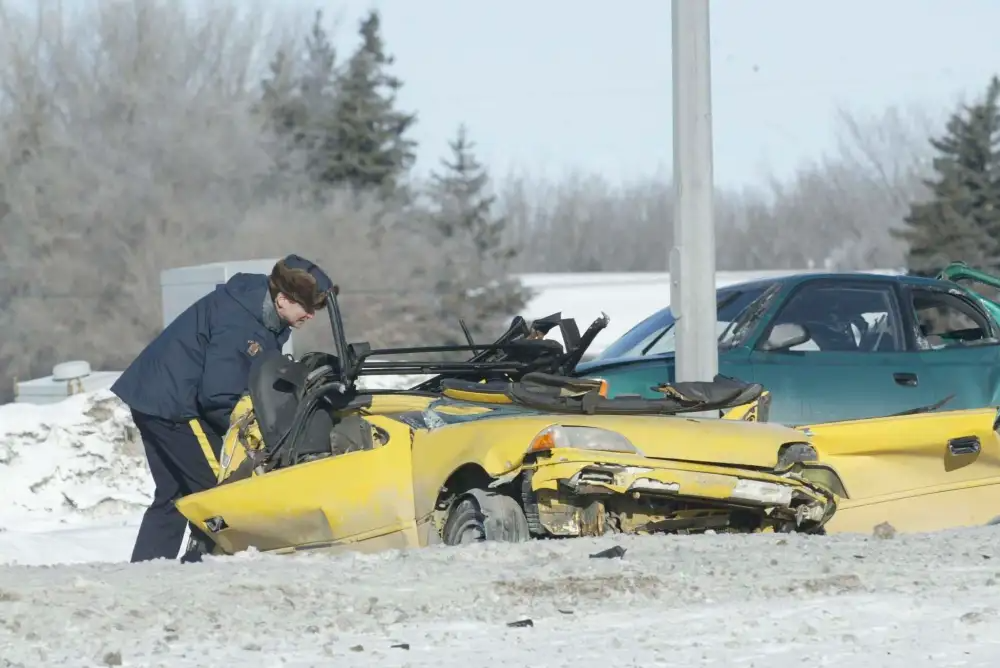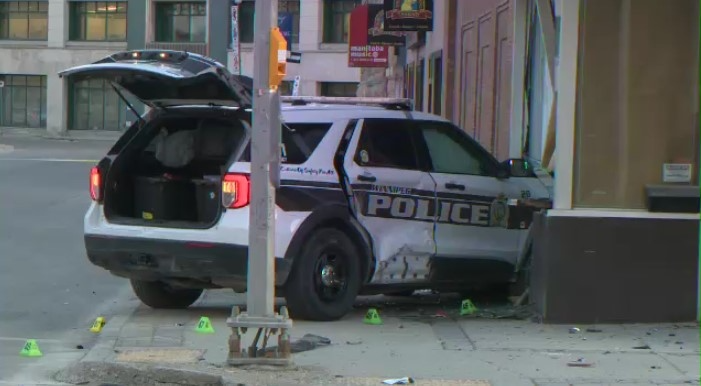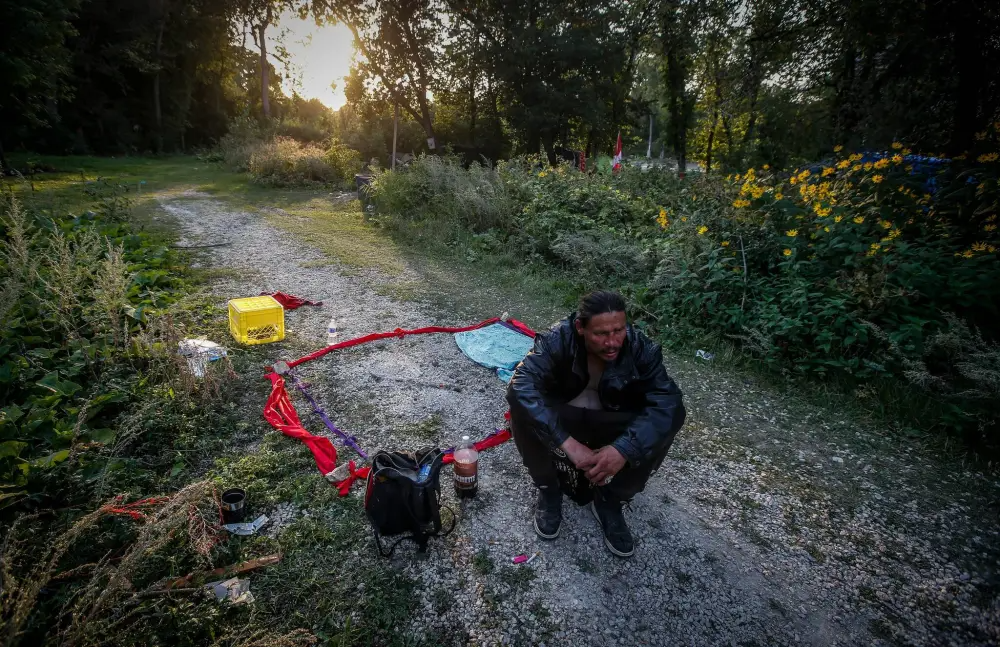On Monday night, Winnipeg Police officers hit and killed Tammy Bateman—an unhoused woman in her 30s—as they drove their vehicle through Fort Rouge Park. While the police initially claimed to have been dropping someone off at the park’s encampment, a resident of the encampment told the Free Press that police had already released the man at a nearby convenience store prior to when “they came racing down here, bat out of hell” and hit Bateman. He also explained that cops stop at the camp several times a day and that visits are “often hostile.” The Free Press reported that Andrew Desjarlais—who Tammy's sister, Lori, described as a father figure to Tammy—“believes police have little respect for the homeless, which is what likely led to the collision.”
Bateman was reportedly struggling with mental health and substance use issues, and was working to secure public housing and a high school education. The state’s “organized abandonment of vulnerable communities” through privatizing and underfunding life-sustaining services like housing and social supports exposes people like Bateman to constant violence by police and carceral systems. Wholly unsurprisingly, however, it is the police themselves who are posturing as victims in this situation, with the acting WPS chief claiming the two cops are “devastated” and “they want to know what happened”—as if they weren’t themselves the ones who hit and killed Bateman.
The WPS, and likely the “Independent” Investigation Unit (IIU) that is now responsible for probing the killing, is already framing Tammy Bateman’s death as a freakish and “tragic” outcome that couldn’t have been avoided. But the WPS has an incredibly long and horrible history of inflicting violence using vehicles, a fact made even more appalling by their dominant role in supposedly promoting “traffic safety” through traffic stops and enforcement. As the Assembly of Manitoba Chiefs wrote in their statement about the killing: “What took place Monday night is not a set of tragic circumstances, and it is hard to see this most recent situation as anything other than police involvement leading to the loss of life.”
Here are some examples from the past few decades that clearly demonstrate the death of Bateman is anything but a mere “tragedy,” with WPS officers having killed and injured countless people while driving. These instances—only a few of the total—also exemplify the myth of “police accountability,” with cops routinely let off or receiving minimal sentences. As with lethal shootings, assaults, restraints, and neglect, WPS violence from behind the wheel continues with near-total impunity.
- 1997: After a night out drinking, WPS officer Bob Lesuk lost control of his motorbike at 70 km/h and 26-year-old passenger Koreen Wood was thrown from it, hitting a pole and later dying from her injuries. Lesuk was convicted of dangerous driving and refusing a breathalyzer, but only received a $500 fine and a short license suspension.
- 2005: WPS officer Derek Harvey-Zenk fell asleep and crashed into the back of a car stopped at red light, killing 40-year-old driver Crystal Taman. Coming from a night of “partying with colleagues,” Harvey-Zenk refused a breathalyzer. Following a notorious botched investigation by the since-disbanded East St. Paul police force, all charges were dropped but for dangerous driving causing death, which he received a two-year house arrest sentence for.

- 2017: WPS officer Justin Holz hit and killed 23-year-old Cody Severight “following an after-work get-together with several colleagues at The Pint.” Holz was speeding prior to the crash, and he fled the scene at up to 130 km/h. A breathalyzer test was delayed for three or four hours after the arrest. Holz was sentenced to two-and-a-half years in jail for dangerous driving causing death, with all other charges—including drunk driving charges—stayed, meaning the trial was halted. Holz was granted parole after only 10 months, meaning he avoided two-thirds of the already short sentence. We have been told that Desjarlais, described as Tammy's father figure, was also Cody's father.
- 2019: While on general patrol, WPS officer John Misiewicz-Buzahora failed to stop at a stop sign and T-boned a minivan, flipping the van onto its side and hospitalizing the four occupants. A nearby resident described home surveillance footage of the crash as: “They were just flying through the stop sign without lights on, no siren, no nothing, just flying.” In mid-2020, Misiewicz-Buzahora was charged by the IIU with three counts of dangerous driving; in early 2022, he pled guilty to one count, receiving a fine of $1,500 and avoiding any license suspension.

- 2021: Running late for surveillance duty and driving at 110 km/h in a 60 km/h zone, WPS officer Bradley Louden crashed an unmarked cruiser into another vehicle turning onto the street. The driver of the car that was hit suffered three broken vertebrae, a fractured pelvis, and a fractured shoulder. Despite the extreme danger of the situation, Louden was slapped with a tiny $780 fine for speeding and had the dangerous driving charge stayed, with the judge even stooping to blame the woman who was hit for making an unsafe turn. In response, criminal defence lawyer Karl Gowenlock told the Free Press that the ruling “really risks feeding into that perception that for whatever reason, police are not held to the same standards and they aren’t prosecuted to the same level as normal citizens.”
- January 2023: While supposedly tracking a suspect, WPS officer Ian Case conducted a “high-risk” U-turn from a parked position into incoming traffic on the Trans-Canada Highway near Prawda, Manitoba, crashing into a vehicle that was driving about 100 km/h. The 22-year-old driver of the car that was hit was hospitalized. A few weeks ago, Case received his punishment for violating the Highway Traffic Act: a $350 fine. Case’s defence lawyer argued that the media attention on the case was because he was a cop and should be regarded as punishment in itself.
- April 2023: While tailing a vehicle that was “driving recklessly and not following traffic signs,” WPS officer Landan Ramage blew through a red light without using a siren—driving up to 81 km/h in a 50 km/h zone—and crashed into another vehicle, subsequently leading the police SUV itself to crash into the wall of a building. The driver of the vehicle that Ramage hit suffered a finger fracture and knee injury. In July of this year, Ramage received a $174 fine.

These seven crashes are only a fraction of the violence and havoc that WPS officers have caused using vehicles, both on- and off-duty. Cops have consistently driven with extreme recklessness, costing the lives of many people including Koreen Wood, Crystal Taman, Cody Severight—and now Tammy Bateman. The cops that have caused these harms have overwhelmingly got off with a tiny fine; even in rare cases when punishment exceeded a fine, it has tended to be in the form of house arrest (Harvey-Zenk) and early parole (Holz), only reinforcing the impunity that cops have compared to everyone else.
There have also been many instances of the WPS intentionally using or threatening to use vehicles as weapons, including at the recent vigil for Doris Porter where it was reported that “police aggressively and repeatedly tried to disrupt her relations taking the street, charging towards families and small children with their SUVs and interrupting ceremony with sirens.” WPS traffic stops and pursuits also frequently end in death and violence.
Making matters worse is the fact that the WPS itself is responsible for all traffic enforcement, from which it directly receives financial benefits—a contradiction that was pointed out by Cody Severight’s aunt in a victim impact statement in 2019: “Cops say 'don't drink and drive,' but this makes me feel like they can do whatever they want.”
Cops will work overtime to downplay their killing of Bateman as a tragic accident. We must reject this whitewashing of WPS traffic violence and recommit to the defunding and abolition of this relentlessly harmful institution.
